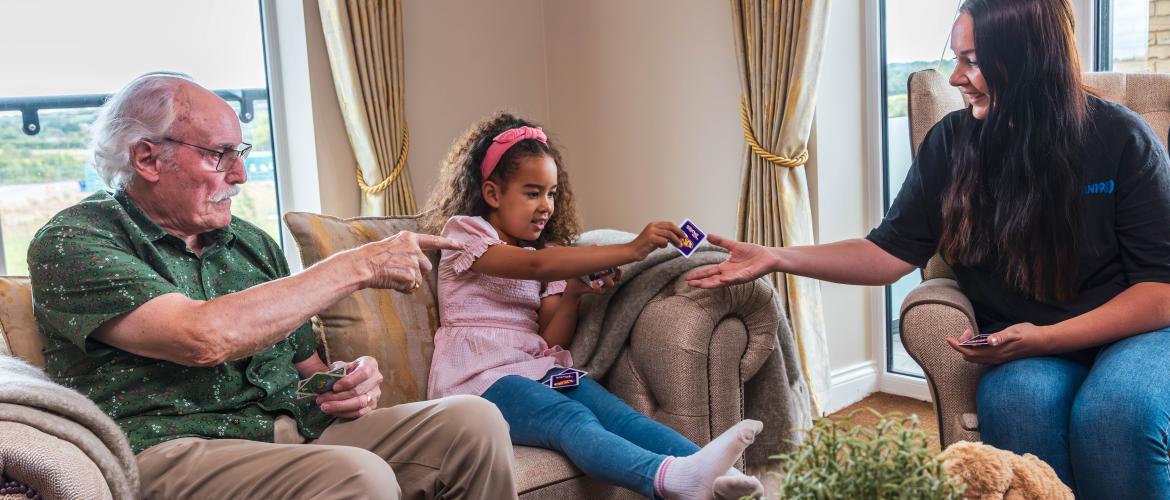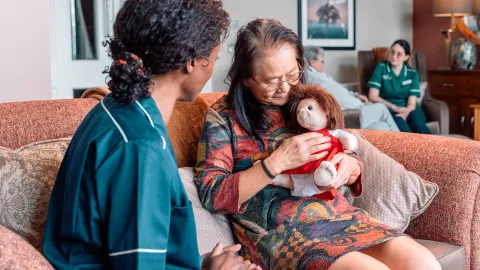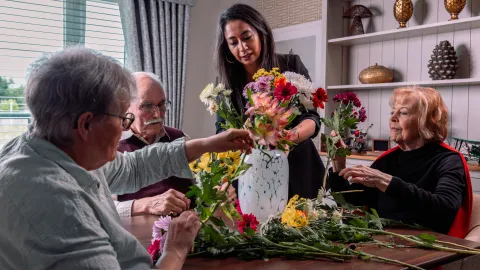
Help & support for dementia carers
Caring for someone with dementia presents unique challenges that can deeply affect both the caregiver and the person being cared for.
The role of a dementia carer is complex, and they often face daily tasks that range from managing changes in behaviour to assisting with personal care, navigating healthcare decisions, and ensuring safety.
At Barchester, we understand that this responsibility can be both mentally and emotionally exhausting, especially as dementia progresses and the needs of the person with dementia change. The purpose of this article is to offer information to support people who are caring for a loved one – from debunking dementia myths and explaining ways to recognise early signs, to advice on financial guidance, communicating effectively and ways to ensure the carer looks after themselves too.
Barchester’s specialist homes up and down the country can provide further advice and a safe environment for those living with dementia. The Memory Lane Communities that feature within Barchester’s homes are specially designed to support independence through wayfinding, reducing distress with visual prompts and relaxing environments – offering peace of mind to carers and families that their loved one is well-cared for, whether this be as a short-term respite or longer term.
Understanding dementia
Dementia is a complex disease and can therefore be difficult to understand. Recognising early signs such as memory lapses, confusion or changes in mood can help carers to respond proactively and help loved ones maintain a good quality of life for as long as possible. Memory loss is an inevitable part of ageing, so it’s important for carers to recognise the difference.
Communication changes can be difficult for families to navigate and may change family dynamics. Through extensive specialist training and understanding of these shifts, our team not only supports individuals living with dementia but also provides guidance and resources for dementia carers and families, helping everyone feel connected and supported throughout the journey.
Recognising early signs of dementia
There are 15 common signs and symptoms of dementia, though it’s important to remember that everyone will experience symptoms in their own way. Perhaps one of the most common symptoms is memory loss, which can lead to the loss of everyday skills and difficulty concentrating.
There are individuals who may exhibit some symptoms of dementia without necessarily having it. For example, there are many treatable conditions and diseases which have similar symptoms, such as liver, kidney, heart and lung problems.
It’s also common for the body and mind to change as we age. Forgetfulness, slight cognitive decline and short-term and long-term memory loss can just be signs of old age. It’s therefore always important to get advice from your loved one’s GP if you’re concerned about changes in their behaviour.
Debunking common dementia myths
Despite dementia affecting over 900,000 people in the UK, there are still many common myths surrounding the disease and those living with it.
Perhaps one of the most common misconceptions is that dementia and Alzheimer's disease are the same, when, in fact, dementia is an umbrella term for a number of cognitive diseases under which Alzheimer’s disease falls.
How dementia affects family dynamics
Everyone’s experience with dementia is different, and circumstances can hugely differ from one family to the next. For those caring for a loved one, it’s important that they have access to help and support for dementia carers to ensure that they don’t burn out.
Relationships and dynamics change, as the person living with dementia comes to rely on loved ones more and more – often resulting in one or more family members becoming full-time carers. It’s important for carers to be prepared for changing behaviours such as the way in which someone demonstrates love and affection, to violent outbursts and individuals not even recognising family members any more.
The NHS offers a list of resources for dementia carers and support options to help prevent them from feeling overwhelmed while caring for someone with dementia. Connecting with other carers can often provide valuable insights into coping strategies and reassurance that they’re not facing this situation alone. Barchester care homes across the UK hold regular dementia support events and meetings to help families in their local community.
Communication and managing behaviour
Supporting someone with dementia requires patience and a clear approach to communication. It is understandable that carers might feel frustrated or hopeless at times, which is why it is so important to build a support network and ask for help if needed,
At Barchester, all staff receive specialist dementia training in managing challenging behaviours and ways to identify the best ways to communicate effectively and relieve distress. Through getting to know a person beyond their care needs, our teams offer a person-centred approach that is individual to each person, and prioritise clear language and positive non-verbal prompts in wayfinding and communication.
Our Dementia Care Specialist Team is consistently keeping up-to-date with the latest research and practices – ensuring that our teams are offering the best support and care possible.
Effective Communication Strategies
Communication is essential for people living with dementia, but as dementia progresses, expressing needs and emotions can become challenging. This can lead to frustration for both the individual and their loved ones.
Both high and low-tech communication tools, such as communication cards or assistive technology like digital assistants, can help bridge this gap. Simple aids, like picture boards, allow individuals to communicate basic needs, while more advanced technology, such as phones with larger buttons and screen readers, can enhance their ability to connect with others.
The right communication tools for those living with dementia often vary from person to person, and may need to be customised to suit an individual’s needs.
Seeking advice from organisations specialising in dementia support can also be invaluable help for dementia carers, and at Barchester, we ensure to create environments which allow individuals to live an enriching life.
Handling emotional outbursts
Often one of the most difficult elements to manage, anger in those living with dementia can affect family members who aren’t used to seeing their loved ones act out of character.
Outbursts can be both verbal and physical, but it’s important to remain calm and remember the person living with dementia is not acting up on purpose. For dementia carers, it’s important to equip yourself with strategies to manage the situation.
Explaining dementia to children
Although it’s a difficult subject to discuss, it’s important to have a conversation with children if a loved one has been diagnosed with dementia.
Children are incredibly intuitive, and can pick up on a change in mood within the family. If the person who has been diagnosed is the child’s parent or grandparent, they are likely to experience a change in their behaviour quite early on and so it’s important to explain the situation so they don’t feel like they’ve done something wrong.
Explaining that the change in their loved one’s behaviour isn’t as a result of something that they’ve done, gives them the opportunity to remain close with the person. Some people living with dementia may be able to talk directly to children, which can be reassuring as it demonstrates they’re still able to maintain relationships.
Barchester’s Dementia Specialists collaborated with children’s author, Virginia Ironside, to create a beautifully illustrated book that helps communicate grandma or grandad’s diagnosis, and their move into a care home to a child.
Daily care and living strategies
We understand the importance of good personal hygiene and routine, and how both can positively impact a person’s well-being, comfort and happiness. As a person’s dementia progresses, they may not remember to wash or brush their teeth as they once did, so it’s important for their carer to support them with this. Structured daily routines and day-to-day tasks can offer a sense of purpose too, with familiar tasks such as setting the table, folding laundry or making a cup of tea adding a sense of purpose to each day.
Tricks for stimulating appetite
Eating for those living with dementia can be challenging, and weight loss is a potential side effect for those living with the disease. There are a number of strategies that can be employed to encourage a balanced diet, however, including how food is presented, and dining with smaller dishes more frequently throughout the day.
Whether it’s finger food, inviting smells, or regular snacks, ensuring that your loved one is consuming enough food can be made easier with the right planning and patience.
Nutrition and diet
A nutritious menu helps to maintain overall wellbeing, but is also a great way of connecting with the person being cared for. Both taste and smell can spark positive memories and conversation.
At Barchester, we provide locally sourced, freshly prepared meals, prepared daily by our qualified and highly experienced chefs, who understand each person’s dietary requirements, as well as their likes and dislikes.
For residents living in our Memory Lane Communities, we ensure the dining room environment is calm and mealtimes are never rushed. For additional support and to encourage independence when dining, we offer beautiful linen set tables, with assisted coloured dining plates and adapted cutlery for those who require it.
Meal planning with finger foods
When we think of finger foods, we often limit ourselves to options like sandwiches, wraps, cakes, or biscuits. However, there’s a much wider range to explore in order to help those living with dementia.
Dementia carers are often encouraged to experiment with different foods, as individuals with dementia may develop new or altered taste preferences over time.
Support for carers
Caring for someone with dementia can be both rewarding and challenging, making emotional and practical support essential for carers.
Local support groups, or online forums can give carers the opportunity to connect with others going through similar experiences, and give a space to share any concerns, learn coping strategies for dementia carers, and gain reassurance that you’re not alone.
Practical support is equally important and often includes respite care which can give carers a much-needed break from the day-to-day care routine. Not only does respite care offer a chance for the carer to relax, it also offers the person being cared for a change of scenery and the opportunity for socialisation and new experiences.
Short-term respite care is also a great opportunity to trial what life in a care home is like, and is often the first step towards moving into permanent residency in a care home. At Barchester, we have over 260 homes across the UK which are on-hand to provide respite services suited to your needs, ensuring that everyone's personal preferences are respected.
Accessing these support options helps carers maintain their own well-being, ensuring they can continue to provide quality care for their loved ones.
Dementia carer support guide
There are 1 in 79 people in the UK living with dementia, and an estimated 700,000 carers. Dementia affects millions of people each year, from the person living with dementia to their loved ones, and it’s important that everyone receives the support that they deserve.
Our dementia carers support guide has information about everything from getting a carer's assessment, to helping someone with dementia with everyday tasks.
Emotional well-being of carers
Family carers take on a lot of responsibility, and the challenges they face can often feel overwhelming. Building a strong support network is essential to help them manage the demands of caring for a loved one with dementia.
If you know a friend or relative who is a family caregiver, there are many ways you can contribute to their well-being. Offering a listening ear, providing emotional support, or helping to arrange respite care are just a few ways to make a meaningful difference. Support for dementia carers can take many forms, both big and small, but all efforts can help lighten the load and show they’re not alone.
Respite care
Respite care can be a wonderful opportunity for both the carer and the person being cared for to take a well-earned break. This is particularly common when friends or family members are acting as a carer, and it allows them time to look after their own health and well-being.
Where the person living with dementia is concerned, taking a respite care break is a great opportunity for increased social interaction with other people in a care home. It gives them the chance to enjoy new experiences, have a change of scenery or perhaps even prepare for full-time care.
The other major benefit of respite care is the support for dementia carers that it offers.
Planning and financial guidance
Caring for someone with dementia often comes with financial pressures for things like medical expenses and home adaptations. It’s important for dementia carers to understand these costs early on in order to navigate the best care options for their loved one.
Individuals may qualify for financial assistance from the government, such as Attendance Allowance or Carer’s Allowance, which can help with the burden. Some local authorities might also provide financial assistance depending on a person’s circumstances, but a care needs assessment will help carers to understand what they’re entitled to.
Legal arrangements are another key consideration for dementia carers. As the condition progresses, the person with dementia may lose the ability to make decisions about their own finances or healthcare. Setting up a Lasting Power of Attorney (LPA) early on ensures that a trusted individual can make decisions on their behalf when needed.
This process should be discussed openly with the person living with dementia while they are still able to express their wishes.
Understanding care home costs
Knowing where to start when trying to understand the cost of care can be tricky, especially as the cost of living in a care home varies based on several key factors.
From the level of care needed, the specific home chosen, and the quality of life it provides, factors such as purpose-built facilities, a comfortable and welcoming environment, nutritious and enjoyable meals, and engaging daily activities all play a role in determining the overall cost.
Paying for a care home
We understand that sometimes it's difficult to know where to start and the thought of paying for care can seem daunting. We've designed a guide to try and answer some of the questions you may have along your journey when choosing a care home, including:
- What to consider when you or your loved one is moving into a Barchester care home.
- What your funding options are.
- What you may need to consider more generally.
Professional help for dementia carers
Seeking professional help or choosing a care home for a loved one can feel like a huge step. There are lots of resources for dementia caregivers, and it’s essential to find the right support, both for your peace of mind and to ensure the best quality of life for the person living with dementia.
Start by considering the level of care required - whether it’s assistance with daily tasks, specialised dementia care, or 24-hour nursing support. Understanding these needs will help narrow down suitable care options, whether it’s in-home care or a care home with dementia expertise.
When selecting a care home, we recommend visiting potential facilities to assess the environment and care firsthand. Look for homes that are purpose-built or adapted for dementia care, with clear signage, safe layouts, and calming surroundings.
For example, in Barchester’s Memory Lane Communities, we incorporate person-centred design in the use of colour and cues to help individuals navigate through the home. Thoughtful interior design features help with reminiscence. Communities are broken up into small units with a family feel, helping people feel safe and comfortable. Care is based on independence, dignity and choice, supported by a person-centred approach to care.
Choosing the right care home
Deciding on the right care home is a huge decision for all parties involved. From the location, type of care on offer, and the overall atmosphere, there’s a lot to consider.
It is sometimes hard to remember all the things you want to ask when visiting a care home, but we’ve created a checklist to help guide you on what to consider when viewing a care home for your loved one.
Choosing a care home FAQs
From finding the best care home for you or your loved one, advice on how to settle into a care home, or any other queries you might have, our FAQs are here to help.
Why dementia care facilities are better for your loved ones
Dementia care facilities are often created as specialised environments for those living with dementia. At Barchester, our Memory Lane Communities are designed to support people to continue living fulfilled lives, to welcome relatives and local communities, and ensure that staff can give their best in a supportive environment.
The physical environment is thoughtfully designed with features such as appropriate lighting, colour schemes, and sensory gardens to aid residents in navigating their surroundings and feeling at ease.
By incorporating small, family-style units, these communities foster safety, comfort, and a homely atmosphere. Their person-centred approach prioritises independence, dignity, and choice, offering activities that preserve life skills and provide a sense of purpose.
A core aspect of our Memory Lane Communities is maintaining each resident's identity by recognising the importance of relationships and understanding personal life histories. Care practices are grounded in empathy, compassion, and individualised support to enhance residents' quality of life.
Find a Barchester care home near you
Barchester Healthcare operates over 260 care homes across the UK, many of which offer specialised dementia care tailored to meet the needs of individuals with memory-related conditions. Use the Barchester care home finder to locate a home which aligns with your loved one's care requirements.


